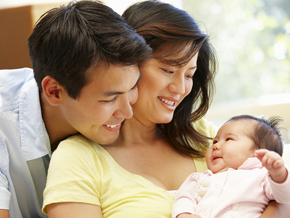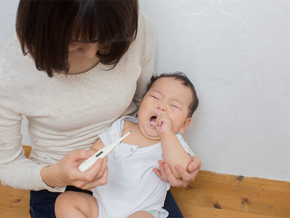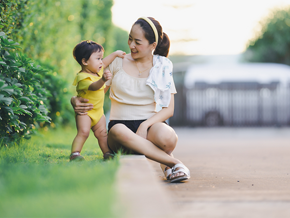
Sitting and Teething! Welcome to Your 6-Month-Old Baby's Milestones
Your 6-month-old baby is learning new skills every day! They're wobbling into a sitting position and becoming fascinated by the food on your plate. Here's a look at the next big steps in their development, from physical growth to changing sleep patterns, so you can support your little one through each exciting change.
Your Baby’s Development at 6 Months
This is a busy stage! While every baby develops at their own pace, you might start noticing some exciting 6-month milestones.
Better mobility and coordination
According to the U.S. Centers for Disease Control and Prevention (CDC), your baby may now roll from tummy to back and back to tummy, and push up with straight arms when on their tummy.
Your 6-month-old is also beginning to sit up, first with your support and eventually on their own for a few moments. Make sure their favorite toys are within reach to encourage them to roll over.
Improved hand skills
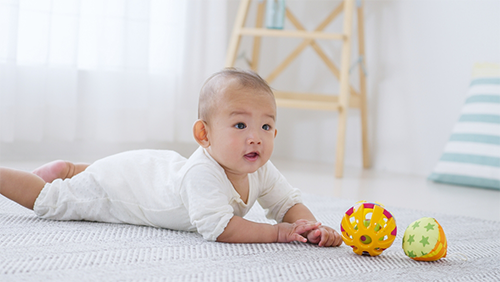
Your baby's hand-eye coordination improves at six months, allowing them to reach for and grasp objects with more intention.
That little grip is getting stronger and more precise! Offer safe objects that your baby can easily grab with one hand because they can now reach for a toy they want. They may even begin passing things from one hand to the other.
You’ll often see them put things in their mouth to explore them, notes UNICEF. They may even start closing their lips to show you they don’t want more food.
Developing social and emotional skills
At this stage, your baby knows familiar people and reacts with smiles, excitement, or even laughs. You might also catch them fascinated by their own reflection in the mirror, a sign of their growing self-awareness.
Learning to communicate
You may hear more babbling, squealing noises, and ‘raspberries’ (sticking out their tongue and blowing). Your baby is also learning to take turns making sounds with you. To encourage this, UNICEF advises talking to them about what’s going on around them.
This back-and-forth is more than just cute; a 2024 study published in Infant Behavior and Development showed that these early conversations may lead to better language skills in the preschool years.
A 2025 study from the journal Infancy found that the type of response matters most: babies were significantly more likely to babble back and extend the conversation when their parents responded with words and sounds, rather than just a smile or a touch.
Teething May Begin
If you notice more drooling or fussiness, your baby might be teething. According to the American Academy of Pediatrics (AAP), the first tooth typically appears between 4 and 7 months of age. You'll typically see one of the two bottom front teeth pop up first, followed by the two top front teeth.
But don't worry if your baby's smile is still all gums—the AAP notes that teething schedules vary and often follow family patterns. In the meantime, providing a safe teething toy can help soothe their gums.
Typical Weight and Height for a 6-Month-Old Baby
Your pediatrician will track the typical 6-month baby weight and height to monitor their growth. By six months, many babies have about doubled their birth weight. According to the World Health Organization's growth charts, the averages for this age are:
| Measurement | Girls | Boys |
| Average Weight | 7.3 kg (16 lbs) | 7.9 kg (17.4 lbs) |
| Healthy Weight Range | 5.7 kg – 9.3 kg (12.5 lbs – 20.5 lbs) | 6.4 kg – 9.8 kg (14.1 lbs – 21.6 lbs) |
| Average Height | 65.7 cm (25.9 in) | 67.6 cm (26.6 in) |
| Healthy Height Range | 61.2 cm – 70.3 cm (24.1 in – 27.7 in) | 63.3 cm – 71.9 cm (24.9 in – 28.3 in) |
Remember, factors like genetics, birth weight, and nutrition can influence your baby's growth. Consistent growth along their curve is the most important indicator of healthy development. You can track your baby’s progress with a Growth Chart Calculator.
What to Expect for Your 6-Month-Old Baby’s Sleep
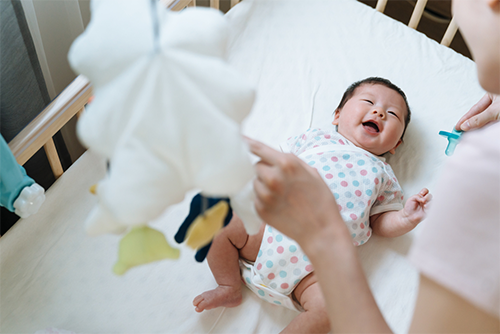
A consistent bedtime routine can help your 6-month-old baby sleep for longer stretches at night, often for 6 to 8 hours.
At six months, your baby's sleep patterns often become more predictable. According to the Sleep Foundation, they need 12 to 16 hours of total sleep, which includes two or three daytime naps and a longer stretch at night.
Don't be surprised if new skills (like rolling over or sitting up) cause temporary disruptions. This is a common phase called sleep regression, where mastering new abilities can temporarily disrupt sleep.
To improve sleep for the whole family, focus on a consistent routine and an early bedtime. A 2025 study in Sleep Health found that a consistent bedtime routine leads to better sleep for the baby and fewer sleep disturbances for parents. The timing of that routine also matters.
A 2020 study in Sleep Medicine found that an earlier bedtime leads to more total sleep, debunking the myth that keeping a baby up late helps them sleep in. If you're considering sleep training, this is an age when some parents begin, but it’s always best to consult with your pediatrician.
Answering Your Top Questions
As you watch your baby grow, it's natural to have questions. Here are answers to some common queries parents have at this stage.
How will my pediatrician check my baby’s development?
At your 6-month check-up, your pediatrician monitors development by observing your baby and asking you questions about their new skills. This visit is the perfect time to share any concerns you have.
Dr. Jack Herrin, a developmental pediatrician who spoke at the parenting seminar "Intentional Parent: Real Talk for Raising Kids with Calm, Clarity, and Connection," says you can also expect more formal screenings later. Your pedia will use questionnaires later, typically at the 9th, 18th, and 30th month visits, with specific autism spectrum disorder screenings at 18 and 24 months.
How active is a 6-month-old baby?
Very active! Tummy time is essential for strengthening their neck and back muscles. They are constantly moving, whether it's rolling across the floor, pushing up on their hands, or kicking their legs with excitement.
My baby is starting to roll everywhere. How do I make my home safer?
Now that they can roll, get down to their level to spot potential hazards. Cover all electrical outlets, secure cords, and move any small objects that could be choking hazards.
It’s also a good time to install safety gates near stairs. Of course, the most important rule is to never leave your baby unattended, especially on high surfaces like beds, sofas, or changing tables.
Seeing your baby discover new skills is one of the greatest joys of parenthood. By providing a safe and loving environment, you are giving your 6-month-old baby everything they need to grow and thrive. Enjoy every babble, roll, and smile during this special time.
Connect with other parents on the ParentTeam Moms and Dads Facebook group and share your own stories about your 6-month-old baby!
References
Cleveland Clinic. "Baby Developmental Milestones (Infant Milestones)." Last reviewed April 3, 2025. Accessed September 11, 2025. https://my.clevelandclinic.org/health/articles/22063-baby-development-milestones-safety.
Luchkina, E., and F. Xu. "How does social contingency facilitate vocabulary development?" Developmental Science 27, no. 5 (2024). https://doi.org/10.1111/desc.13525.
Mayo Clinic Staff. "Infant development: Milestones from 4 to 6 months." Mayo Clinic, March 13, 2025. Accessed September 11, 2025. https://www.mayoclinic.org/healthy-lifestyle/infant-and-toddler-health/in-depth/infant-development/art-20048178.
MedlinePlus. "Developmental milestones record - 6 months." Last reviewed February 17, 2024. Accessed September 11, 2025. https://medlineplus.gov/ency/article/002008.htm.
Nemours KidsHealth. "Sleep and Your 4- to 7-Month-Old." Last reviewed July 2022. Accessed September 11, 2025. https://kidshealth.org/en/parents/sleep47m.html.
pregnancybirth&baby. "Your baby's growth and development - 6 months old." Last reviewed December 2022. Accessed September 11, 2025. https://www.pregnancybirthbaby.org.au/babys-growth-and-development-6-months-old.
raisingchildren.net.au. "About sleep." n.d. Accessed September 11, 2025. https://raisingchildren.net.au/newborns/sleep/understanding-sleep/about-sleep.
Sinthong, A., and D. Ngernlangtawee. "Early sleep intervention for improving infant sleep quality: a randomized controlled trial, preliminary result." BMC Pediatrics 24, no. 306 (2024). https://doi.org/10.1186/s12887-024-04771-6.
Zubler, Jennifer M., Lisa D. Wiggins, Michelle M. Macias, Toni M. Whitaker, Judith S. Shaw, Jane K. Squires, Julie A. Pajek, et al. "Evidence-Informed Milestones for Developmental Surveillance Tools." Pediatrics 149, no. 3 (2022). https://doi.org/10.1542/peds.2021-052138.










